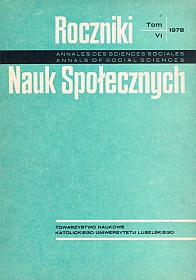Kształcenie jako czynnik rozwoju gospodarczego. Próba diagnozy na podstawie krajów gospodarczo rozwiniętych w latach sześćdziesiątych
Abstrakt
Contemporary research is paying more and more attention to non-economic factors and their function in economic development. Particularly important among these factors is education. In this paper, an attempt was made to describe mutual links between education and economic development. With a view· to achieving this goal, the author analyses the situation of developed countries, and at the same time he places his analysis against the background of a world-wide situation.
The analysis is based on a set of indicators reflecting both these processes. Confrontation of the indicators of education and economic development, and the calculation of correlation coefficients showed links and interdependence of both these processes in particular countries and group of countries.
On a world-wide scale, there can be found a high level of identity between the processes of education and economic development (correlation coefficients higher than 0,8). In certain regional groups of countries, the situation is different. Within the group of developed countries, differentiation exists between the European socialist countries and the West-European and North-American countries. Differences — which are shown by correlation coefficients — include all systems of education and types of jobs secured by students upon graduation. The differentia- ting factors are above all different preferences functioning in the sphere of choice of the field of university studies, percentage of women in engineering studies and the extension of extramural and for adults studies.
In macro-scale, the research confirmed analogous calculations done by Harbison and Myers for the years 1958. Regional analyses threw a new light on educational and economic situations and new development tendencies accepted in this field.
Copyright (c) 1978 Roczniki Nauk Społecznych

Utwór dostępny jest na licencji Creative Commons Uznanie autorstwa – Użycie niekomercyjne – Bez utworów zależnych 4.0 Międzynarodowe.


